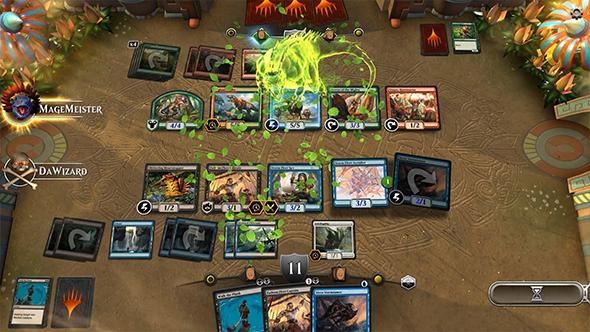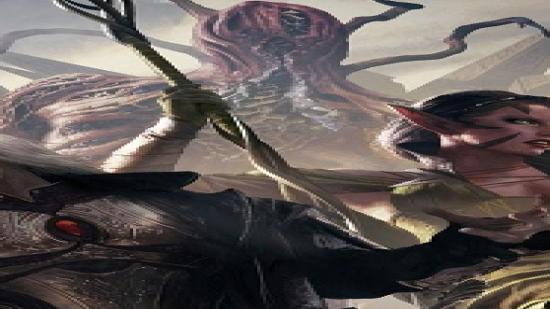Magic the Gathering: Arena is a digital adaptation of the world-famous card game, currently in closed beta. We spoke to the game’s executive producer, Chris Cao, about balancing the game’s economy, as well as the challenges of converting the tabletop game into a “unique digital experience.”
Here’s what Magic: The Gathering Arena needs to do to compete with Artifact and Hearthstone.
Why do packs in Arena have eight cards rather than 15?
There’s actually two kinds of packs we have. We have 14 card packs for Draft, because Draft requires them – it’s not legitimate Draft unless you have those cards to make the Limited format. The difference there is that Draft packs don’t have Wildcards because Limited would be really squirrely if you could get any card you wanted, so we wanted to maintain the Draft experience.
The reason we went with eight on the regular booster packs is that we actually changed the number of Uncommons and Commons. [We did this] because to a new player – or to Hearthstone players, or any other CCG players – a lot of cards can be very intimidating, especially with the depth that Magic has. Our cards say a lot, and do a lot, often more so than in other games. We wanted to make sure to have the anchor of the Rare and the Mythic Rare cards that are in the pack, and we wanted to make sure we give the Uncommons, and then a smattering of the Commons.

What we also do is give out Wildcards and individual card rewards in different ways. Think of it as us giving the pack as the core identity, because that’s very Magic, but then we give out lots of other cards in lots of different ways. The community has actually helped us a lot with their feedback in terms of what’s satisfying and what’s not.
Even in the current live build, for example, you get a card after every win, but most of the time you get a Common one. We’ve reworked that for this new release, where if you’re in the Quick Constructed mode, you can win your gold back, you can win more gold, and you can win three of these cards at once, and they all start at Uncommon. It’s actually been very helpful to listen to players, and we think of it as our distributive pack – when we take a pack apart and give you different pieces of it. All of those factors contributed to the pack size we have, and the strategy beyond just those packs.
Has the transfer from a TCG to a CCG has caused any mechanical problems?
It’s interesting because we’re only just discovering what the audience who like tabletop are really telling us. We’ve started with some of the modes, and I think we’ll get more feedback as Constructed comes out. I think that’ll keep happening. We’ve already had some feedback like ‘The cards are square instead of rectangle and that feels weird’, or around the tapping distance. Some of those might seem small, but you have people who have been playing this one game this way for decades. And while [developers Wizards of the Coast] have offered some other variants, this is the one where we’re saying ‘Hey, this is the legitimate Standard. I’m looking forward to more of those conversations.
Any particular areas?
I think the economy discussion has been really interesting – we’ve had some great feedback from folks all over the place, because a lot of them are used to paying for Magic in a certain way, and trading in a certain way, and now they have the ability to play Magic on demand all the time, for free. And people are gonna have all sorts of expectations there, but it’s interesting how it’s come down to a really cool conversation between us all, where we just get an experience that I don’t think Wizards has ever gotten before.
Specifically in regards to the events as we roll them out, we’re interested in more of that feedback – because what we want to do is keep people playing Magic. We make so many cards a year, but there’s gotta be a lot of variety so you can find a new kind of Magic, or help us take one of those familiar fun fan formats and translate it. It’s pretty exciting to have a game that’s live and can respond quickly.
How are you planning to bring this number of cards to the game?
We create not only a lot of content, but it’s a lot of /deep/ content. So clearly, every once in a while, the designers of the card game get pleasantly surprised by the combinations that the players make up, and that’s just at the card level. We’re really not about quantity for quantity’s sake – it’s about displaying that variety of what’s happening, with all of the different cards.
So for the balance side of it, we’re working with R&D, and the normal techniques they’re using for those cards, as far as what’s officially available. But we want to continue to develop modes – what happens at Rotation? What happens to cards that are banned? – and figure out where else can we use them. I think, as a digital product, there’s flexibility that may not be always as available to the physical product because of the nature of the medium. We haven’t run into anything that I would say is an ‘Oh no’, I think it’s been more of a ‘How can we do better?’, or ‘How can we make digital a better experience for what it offers?’, rather than something that’s a show-stopper.
How will Rotations work on a longer-term basis?
It’s a question that we’re answering right now by watching the plans and how they’re playing. The short answer is we’re going to announce before open beta, so when folks are spending their money for reals they know exactly what they’re going into. Really, what we’re trying to do is figure out ‘What does it mean digitally?’, and ‘What does it mean specifically with the free-to-play rate that we have and how you can earn cards’? We clearly don’t want rotation to be a big negative, instead we’d rather it be a celebration and a fun time.
It’s sort of a way of saying ‘We’re working on it right now’, and we’re internally trying some ideas out ourselves. We want to announce it shortly, or as soon as the open beta comes about, but we don’t have anything totally set yet because it’s tricky, and we can’t just follow paper’s lead on it. It means something for Arena when we say Rotation.
A concern for people coming into other CCGs is price of entry. How big an impact does that have on development?
I think we get this question asked in a lot of different ways. One of the most pointed ones is ‘How long does it take for me to get the best stuff?’. Most people in any free-to-play game are gonna ask that. But I think that’s just one of the questions to answer in your larger question, because I think really it’s ‘How do I have fun in Magic and keep feeling like I’m making meaningful progress?’, and even as a free player, ‘How can I participate in the game, get cool cards, play in the events, how does that happen?’.
Our focus overall has been on making sure that people can get a good amount of value in a fairly short period of time each day, so they can make our game a regular part of their gaming life. Within the first hour to hour and a half, as well as most of your quests and win bonuses, 1000 gold or about a pack’s worth of gold and cards are earned. The reason for that is that we want to give you a starting point. And then you move from that to an event – do you want to do Quick Constructed and try to use your skill and get more?

I think that’s the second half of that sort of question, which is depending on how skilled you are, you’ll win more, you’ll be able to get more benefits out of this system, which then promotes your skill continuing to grow. Our matchmaking system will make it so it’s not just like the very best people are mixed in with everyone else, but as you rise through the rungs of the ladder and your deck and skill improves, our goal is for you to just enjoy more and more Magic. Tier 1 is just one slice of what Magic offers, especially across so many cards, and we really think even the starting decks we’re giving are hugely diverse, in terms of explorer decks vs merfolk decks vs vampire decks. Those are just the tribals of the current deck meta, but there’s so much more that we’ve seen players in beta doing with it.
Our real goal is to give you the whole of Magic, and give you the opportunity to go where you want to in it – if you’re going towards that Tier 1 thing, to give you a clear path to it. I think every person is going to evaluate what’s different, I don’t think it’s easy to simplify Arena to say ‘Time to Tier 1 is what matters’, I feel like it’s ‘Are you having fun today, do you feel like you’re making the progress you want, do you feel like you can choose the direction you want to go in?’, and that’s what we’re really trying to serve.
